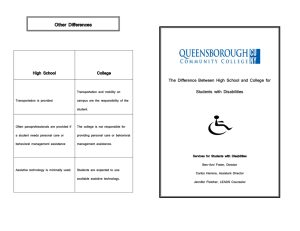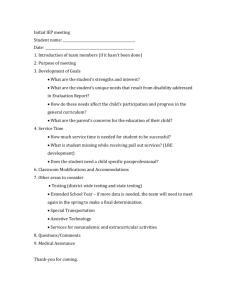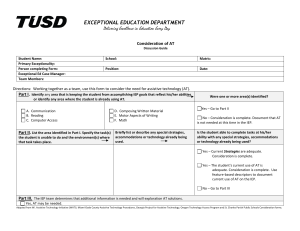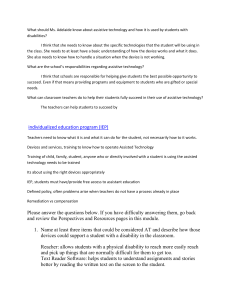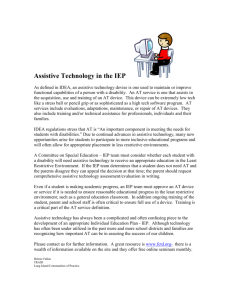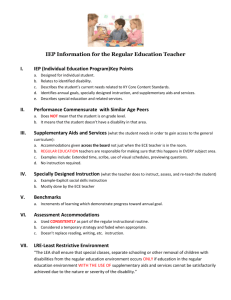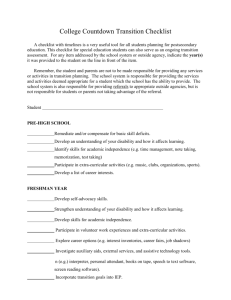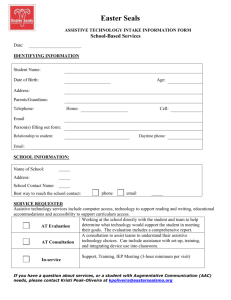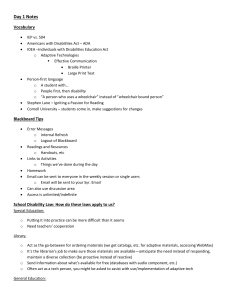Stage E Types of Accomodations
advertisement
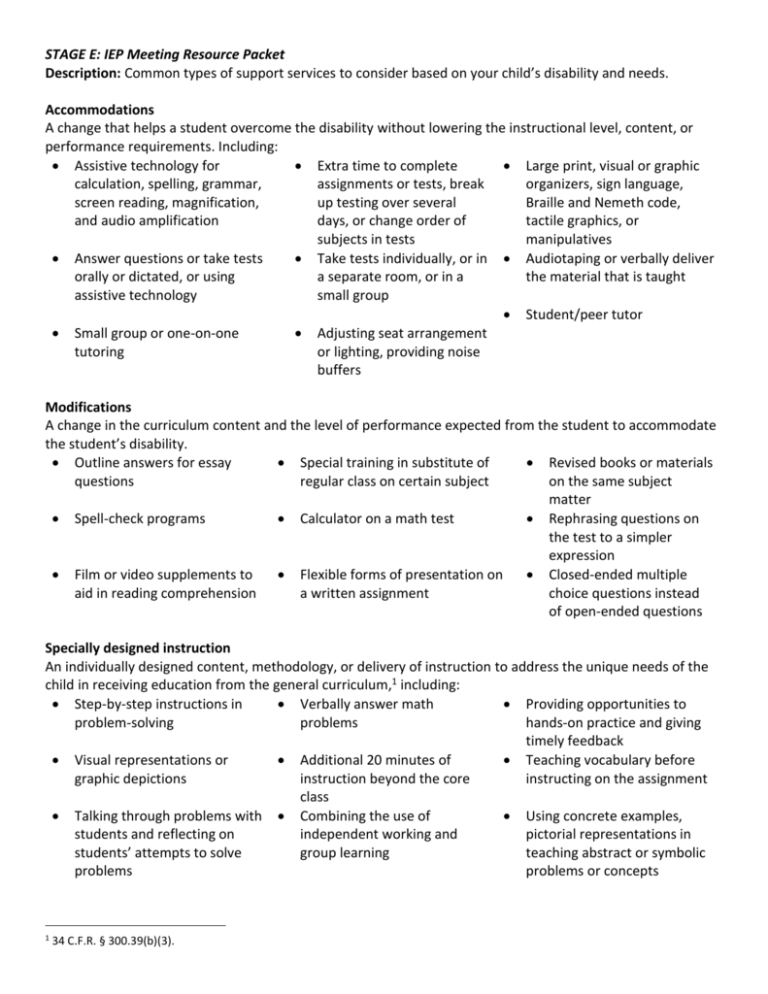
STAGE E: IEP Meeting Resource Packet Description: Common types of support services to consider based on your child’s disability and needs. Accommodations A change that helps a student overcome the disability without lowering the instructional level, content, or performance requirements. Including: Assistive technology for Extra time to complete Large print, visual or graphic calculation, spelling, grammar, assignments or tests, break organizers, sign language, screen reading, magnification, up testing over several Braille and Nemeth code, and audio amplification days, or change order of tactile graphics, or subjects in tests manipulatives Answer questions or take tests Take tests individually, or in Audiotaping or verbally deliver orally or dictated, or using a separate room, or in a the material that is taught assistive technology small group Student/peer tutor Small group or one-on-one Adjusting seat arrangement tutoring or lighting, providing noise buffers Modifications A change in the curriculum content and the level of performance expected from the student to accommodate the student’s disability. Outline answers for essay Special training in substitute of Revised books or materials questions regular class on certain subject on the same subject matter Spell-check programs Calculator on a math test Rephrasing questions on the test to a simpler expression Film or video supplements to Flexible forms of presentation on Closed-ended multiple aid in reading comprehension a written assignment choice questions instead of open-ended questions Specially designed instruction An individually designed content, methodology, or delivery of instruction to address the unique needs of the child in receiving education from the general curriculum,1 including: Step-by-step instructions in Verbally answer math Providing opportunities to problem-solving problems hands-on practice and giving timely feedback Visual representations or Additional 20 minutes of Teaching vocabulary before graphic depictions instruction beyond the core instructing on the assignment class Talking through problems with Combining the use of Using concrete examples, students and reflecting on independent working and pictorial representations in students’ attempts to solve group learning teaching abstract or symbolic problems problems or concepts 1 34 C.F.R. § 300.39(b)(3). STAGE E: IEP Meeting Resource Packet Related services Services to assist a child with a disability in general education2 and help correct problematic behavior including: Qualified professionals to help Medical services such as Physical therapy addressing a children in decision-making, bladder catheterization, child’s posture, muscle health awareness, tracheostomy tube suctioning, strength, mobility, behavior in rehabilitation, goal-setting, positioning, and monitoring of educational environments; or and personality development ventilation preventing the progression of impairment 3 Extended school year , Occupational therapy for self- Psychological services, such as continuing educational help skills, social etiquette, counseling, social work instruction during summer safety training, behavioral services, and positive behavior break to consolidate learning therapy, sensory-motor supports4 progress processing, and athletic skills Orientation and mobility Interpreting services, such as Speech-language therapy and training for children with oral translation and cued audiology services, such as visual impairments language hearing aids or clinics Recreation or therapeutic Transportation from and to recreation school, and on campus Supplementary services Other services enabling children with disabilities to be educated with nondisabled children to the maximum extent appropriate; such services will only be a part of the FAPE if it is necessary to the children’s needs.5 Assistive technology, such as a Home/School collaboration, Adapted materials, such as word processor, special collaboration/consultation books on tape, large print, or software, or a communication with other professionals, such highlighted notes system as parent counseling Special education training for Peer tutors One-on-one aide child’s teacher or other supporting professional For more information and examples on how to choose strategies for your children, please see http://web.richmond.k12.va.us/Portals/47/assets/Accommodations_and_Modifications_Guide.pdf; http://www.parentcenterhub.org/repository/assessment-accommodations/; http://www.wrightslaw.com/info/sec504.accoms.mods.pdf; http://www.roseburg.k12.or.us/depts/educate/documents/diploma/AccomodationsMod.pdf; https://www.youtube.com/watch?v=j08HLISVBhg 2 34 C.F.R. § 300.34; see also http://www.parentcenterhub.org/repository/iep-relatedservices/. 34 C.F.R. § 300.106. 4 34 C.F.R. § 324(2)(i). 5 71 Fed. Reg. 46570, 46573. 3


